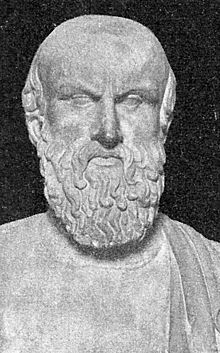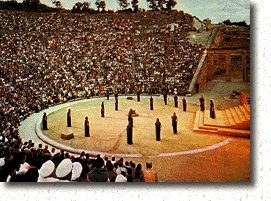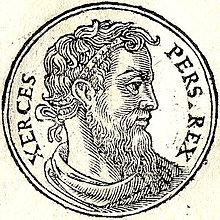 Let’s say you are considered the “father of tragedy”. Even in your own lifetime, everyone knows you have revolutionized drama and changed the theatre game. Do you think it would be mentioned on your tomb? Surely a throw away reference at least?
Let’s say you are considered the “father of tragedy”. Even in your own lifetime, everyone knows you have revolutionized drama and changed the theatre game. Do you think it would be mentioned on your tomb? Surely a throw away reference at least?But no, not for Aeschylus. The man who wrote between 70 and 90 plays, won 28 competitions and completely altered the face of the stage, says nothing about it in his eulogy. His tomb engraving, which he wrote himself, only talks about his military accomplishments.
Now, why would a man who has gone down in history as a playwright, only describe himself as a soldier? Actually it makes a lot of sense when you consider his life.
Aeschylus was born of a well-to-do family in 525 B.C. He was reared in the town of Eleusis, about 27 kilometers northwest of Athens. But he didn’t start off as a writer at all.
The legend goes like this: the young fellow was working in a vineyard helping ‘guard’ the grapes when he fell asleep. The god Dionynus, patron saint of both wine and drama, visited him in a dream. The bacchus divinity told him to leave his grape picking days behind him: he should inscribe scripts instead. The very next day the lad took a try at the pen and realized immediately that he had a gift.
His first play, produced when he was 26 years old, did not win him much success. It was not long, however, before he was triumphing at all the competitions and beating the likes of Sophocles and Euripides.
But his life wasn’t all wining, winning and writing. There was also a lot of war. His days in ancient Greece saw the major turning point of the Persian war, and he had front row seats. In fact, in 490 BC, Aeschylus and his brother Cynegeirus fought in the famous Battle of Marathon. They were defending Athens against Darius I‘s invading Persian army. Though outnumbered, the Greeks won, gaining confidence and perhaps changing western history as we know it. Unfortunately for our fighting brothers, only one made it out alive.
Returning to his homeland, Aeschylus took inspiration from the theatre of war to the stage of tragedy. Even his tone is said to have barked like a bugle. It is during this time at home, that he changed drama as we know it. Previously a play consisted of one actor and the chorus which mostly danced around the orator. Aeschylus was the first to write in an additional actor, therefore creating interaction between the characters. His revolutionary approach to the art finally brought him victory at the City Dionysia in 484BC, the first of many.
But Aeschylus did not stay the play writing civilian for long. In 480, he was called back into military service, but this time against Xerxes I‘s invading forces at the Battle of Salamis. He left the field with honor, losing part of a limb in the scuffle. This event was a highlight for him nonetheless, as he was renowned and took the actions as fodder for his play, The Persians, which was performed in 472 BC and won first prize at the Dionysia.
Then there was the religious side of Aeschylus. He was initiated into the Eleusinian Mysteries, a secretive cult based in his hometown which worshipped Demeter, the goddess of hearth and grain. Like many creepy sects, members were sworn to secrecy, under penalty of death.
This, rather than the blood letting wars, was his downfall. Apparently the playwright, who also acted and directed, revealed a few choice mysteries in his play The Eumenides. He was almost stoned to death on stage, but managed to escape to safety to the alter of Dionysus.
He then stood trial for his impiety and pleaded ignorance. He was finally acquitted, due to his heroic military past. Apparently his youngest brother gave him a helping hand by showing the jury Aeschylus’ stump, the result of the battle of Salamis, where he was voted bravest warrior. (Though this last part was not, in fact, true).
However, his unpopularity continued none the less and in 458 BC, he practiced his right of self banishment. He returned to Sicily, where he still had friends and eventually died in 456 or 455 BC. The rumor is he met his end when an eagle dropped a turtle on his head, thinking his baldness was a stone. It is much more likely, however, that he expired due to being the ripe old age of 70.
But before Aeschylus gave up the ghost, he inscribed the following words, reminding everyone of all the things that had made him a hero and purposefully ignoring his then ‘unpopular’ accomplishments:
Αἰσχύλον Εὐφορίωνος Ἀθηναῖον τόδε κεύθει
μνῆμα καταφθίμενον πυροφόροιο Γέλας·
ἀλκὴν δ’ εὐδόκιμον Μαραθώνιον ἄλσος ἂν εἴποι
καὶ βαθυχαιτήεις Μῆδος ἐπιστάμενος[20]
Beneath this stone lies Aeschylus, son of Euphorion, the Athenian,
who perished in the wheat-bearing land of Gela;
of his noble prowess the grove of Marathon can speak,
and the long-haired Persian knows it well.











3 comments
Kudos to you! I hadn’t thoguht of that!
Janel, Drew sounds like he is full of diairmentteon and I completely agree with you on the fact that his attitude will get him through the leg surgeries and rehab. In the pics you posted it looks like he is holding a little ball, if he can do that he will be holding a cup in no time! If he wants to walk so badly it makes sense to try and let him. He will still find ways to use his legs for compensation if he needs to. He will find a way! Best of luck to your family in the coming months! Praying that things go smoothly!
A great little article: thanks for the additional Aeschylus trivia. Check out the literatureandhistory.com podcast for the brilliant 3-part series on the Oresteia Trilogy (Aeschylus’ masterpiece). Or learn the full back story of Agamemnon, his wife, his doomed daughter, and his failed/glorious leadership in the Trojan War, at trojanwarpodcast.com
Trackbacks
Our apologies, you must be logged in to post a comment.